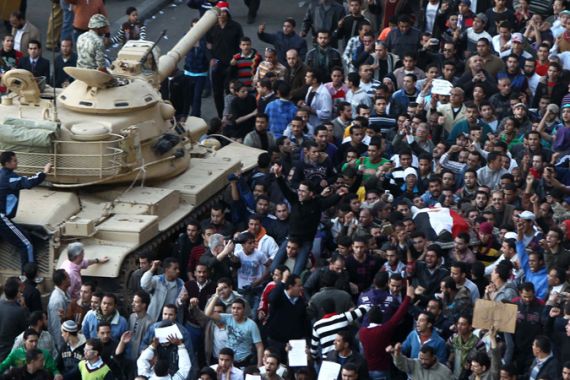Pressure builds on Mubarak
Protests continue as world leaders keep up pressure, urging for sweeping reforms in Egypt.

| Images of the thousands of Egyptian protesters that continue to defy a curfew in the capital Cairo and other cities |
The United States and other leading European nations have urged Hosni Mubarak, the Egyptian president, to refrain from violence against unarmed protesters and work to create conditions for free and fair elections.
Washington told Mubarak on Saturday that it was not enough simply to “reshuffle the deck” with a shake-up of his government and pressed him to make good on his promise of genuine reform.
“The Egyptian government can’t reshuffle the deck and then stand pat,” State Department spokesman PJ Crowley said in a message on Twitter after Mubarak fired his government but made clear he had no intention of stepping down.
“President Mubarak’s words pledging reform must be followed by action,” Crowley said, echoing Obama’s appeal on Friday for Mubarak to embrace a new political dynamic.
‘Recognise human rights’
In a statement released in Berlin on Saturday, the leaders of Britain, France and Germany said they were “deeply worried about the events in Egypt”.
“We call on President Mubarak to renounce any violence against unarmed civilians and to recognise the demonstrators’ peaceful rights,” the joint statement said.
“We call on President Mubarak to begin a transformation process that should be reflected in a broadly based government, as well as free and fair elections.”
The European trio appealed to Mubarak to respond to his people’s grievances and take steps to improve the human rights situation in the country.
“We recognise the balanced role that President Mubarak has played for many years in the Middle East. We call on him to adopt the same moderate approach to the current situation in Egypt,” the statement said.
“Human rights and democratic freedom must be fully recognised, including freedom of expression and assembly, and the free use of means of communication such as telephone and internet.”
Vice-president appointed
The international messages came hours after Mubarak appointed the country’s head of intelligence to the post of vice-president, in a move said to be a reaction to days of anti-government protests in cities across the country.
Omar Suleiman, once Egypt’s chief spy, was sworn in on Saturday, marking the first time Mubarak has appointed a vice-president during his 30-year rule. Ahmad Shafiq, a former air force commander, was appointed prime minister.
The appointments failed to satisfy protesters in the country, however, as Al Jazeera’s correspondents in Egypt said that many of those taking to the streets demanded a total change of guard, as opposed to a reshuffling of figures in the ruling National Democratic Party (NDP).
Tens of thousands of people continued to rally in the capital Cairo on Saturday, demanding an end to Mubarak’s presidency.
The demonstrations continued in defiance of an extended curfew, which state television reported would be in place from 4pm to 8am local time.
A military presence also remained, and the army warned the crowds in Tahrir Square in Cairo that if they defied the curfew, they would be in danger.
Military’s role
But the protesters in Tahrir Square demonstrated in full view of the army, which had been deployed in the city to quell the popular unrest sweeping the Middle East’s most populous Muslim country since January 25.
Al Jazeera’s Ayman Mohyeldin, reporting from the capital, said that soldiers deployed to central Cairo did not intervene in the protests.
“Some of the soldiers here have said that the only way for peace to come to the streets of Cairo is for Mubarak to step down,” he said.
The number of people killed in protests over the past five days is reported to be in the scores, with at least 23 deaths confirmed in Alexandria, and at least 27 confirmed in Suez, with a further 22 deaths in Cairo.
Similar crowds gathered in the cities of Alexandria and Suez on Saturday, Al Jazeera’s correspondents reported.
In Suez, Al Jazeera’s Jamal ElShayyal reported that 1,000-2,000 protesters had gathered, and that the military was not confronting them.
ElShayyal quoted a military officer as saying that troops would “not fire a single bullet on Egyptians”.
The officer also said the only solution to the current unrest was “for Mubarak to leave”.
ElShayyal said that 1,700 public workers in Suez had gone on an indefinite strike seeking Mubarak’s resignation.
Cabinet resigns
Earlier on Saturday, the Egyptian cabinet formally resigned in response to the protests, and Ahmed Ezz, a businessman and senior figure in the ruling NDP also stepped down from his post as chairman of the Planning and Budget Committee.
Protesters ransacked and burned one of his company’s main offices in Mohandiseen, an area of Cairo.
Mohamed ElBaradei, a leading opposition figure, told Al Jazeera that protests would continue until the president steps down.
He also stressed that the political “system” will have to change in Egypt before the country can move forward.
The former head of the International Atomic Energy Agency (IAEA) also expressed “disappointment” with the US reaction to the protests, though he stressed that any change would have to come from “inside Egypt”.
He said Mubarak should put in place an interim government that would arrange free and fair elections.